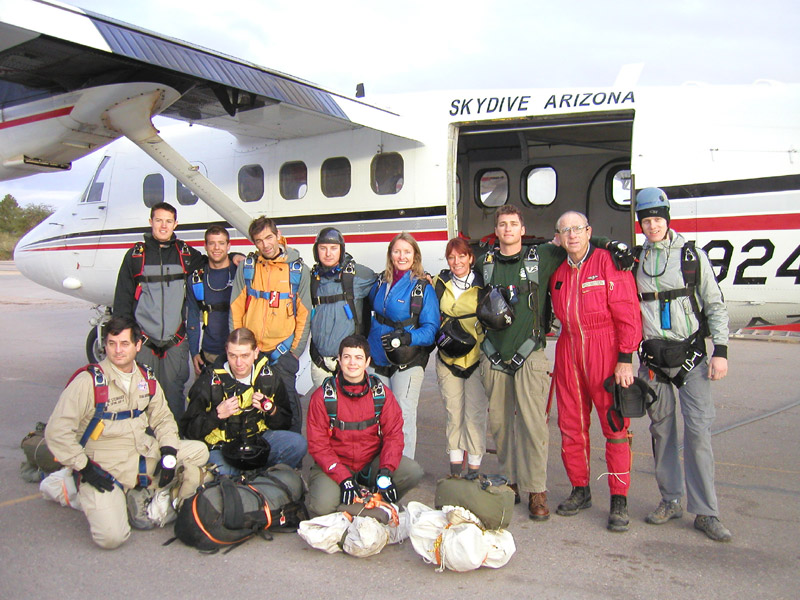Imagine throwing a weekend supply of backpacking gear out of an airplane, then jumping out after it and hiking around the desert for a couple of days. That's what the nine students in Airdrop Assist's Basic Boot Camp did in December, at Skydive Arizona. Why did they do this? It was to train for future remote-area humanitarian expeditions with volunteer organizations like Remote Area Medical and its "RAM Airborne" team.
The Volunteer Training Course
Of course, this is not all they did. The desert airdrop and hike was preceded by two and a half days of training activities, in the classroom and in airplanes. There were prerequisites too, in order to ensure a basic incoming skill level, including: a USPA-B or equivalent license, a 150 jump minimum, basic first aid certification, navigation skills, outdoor living, and more. Instructors covered old, sometimes forgotten, skills plus new ones; including: spotting, landing accurately and softly under a low-loaded wing, packing round parachutes, and preparing cargo bales for airdrops. In the short 4 ½ day period, students covered a lot of ground, during 12-hour days, and wanting more.
The first course of this type was held in March 2006, where another nine students got to experience the thrill of pushing out cargo, jumping into remote sites, and testing their hop and pop skills. The revised syllabus maintained the core content of cargo bale handling but included a more physically challenging aspect, including a 12-mile hike with full backpacks, a 1,300 foot climb against the clock, and outdoor living for the duration of the course. Courses are planned to be held at least twice per year, roughly in March and December. The dates may vary, with the next one scheduled from March 9-13, 2007, and all events are posted at www.airdropassist.org/schedule.htm
Humanitarian Aid - At Home
Airdrop Assist is a newly-formed nonprofit school, aimed at meeting the gap between volunteers and the rigors of remote-area volunteerism, among other things. Given the fact that the majority of Americans are overweight, a person's ambitions may not meet the standards imposed by a harsh environment; some people have it, others need to work toward it. This school is here to bridge that gap. The potential volunteer is someone who savors the outdoors, accessible only by airdrop in some places, and who is willing to endure hardship while providing humanitarian aid to those in need. It is a privilege to be in the position to provide care for another person, and an adventure when you add skydiving.
Airdrop Assist seeks to train volunteers who can provide a wide variety of humanitarian aid; this aid begins at home, with local volunteerism. In addition to remote-area aid, local drop zone care is another area of concern. Work is being done to create a higher standard of safety on the home front. As part of this, the well-established "Wilderness First Responder" training program is being proposed for this fall, at Skydive Arizona, geared towards skydiving-related injuries.
In coordination with members of drop zone operations, such as Skydive Carolina and Skydive Arizona, we are seeking ways in which to establish training and certification programs, along with practical protocols and procedures, which proactively deal with emergency care during skydiving activities, through a network of volunteers.
In addition to the Wilderness First Responder training at Skydive Arizona, Skydive Carolina has been actively developing procedures and protocols, for medically and non-medically trained members of their drop zone, to use in the event of an emergency. The goal is to develop a globally acceptable program, which can be adapted to the distinct needs of differing drop zone operations and skydiving events. Both of these programs are under development and are seeking ways to increase support and to research ways in which to make the training, protocols and procedures effective at drop zones worldwide.
More Information and More Ways to Join
Volunteerism with Airdrop Assist and Remote Area Medical, a.k.a. RAM, are not limited to airdrop activities in foreign countries. RAM holds medical clinics year round, focused around Knoxville, TN. For more information on this and other clinics held by RAM, go to www.ramusa.org
Airdrop Assist also offers many other opportunities to get involved. Being a new nonprofit organization, all skills are needed, in order to make the school a success. This is an exciting time in skydiving and enthusiastic, creative volunteers are in high demand - in the air, on the ground, and over the internet. Also, for anyone who has an old skydiving rig, or other gear, an easy way to get value out of it is to donate it! Let Airdrop Assist find a way to put your gear to use, towards a humanitarian purpose. For more information, contact Airdrop Assist at [email protected] or visit our website at www.airdropassist.org.
Students:
- Marc Bucaro
- Kyle Ewing
- Anne Helliwell
- Raistlin Majere
- Paul Maresca
- Matt Oakleaf
- Victoria Smith
- Jaap Suter
- Alex Volk
Instructors:
- Bryan Burke
- Karen Hawes
- Larry Richardson
- Rene Steinhauer
Volunteers:
- Stuart Pearson
- Gabe Restine




There are no comments to display.
Join the conversation
You can post now and register later. If you have an account, sign in now to post with your account.
Note: Your post will require moderator approval before it will be visible.